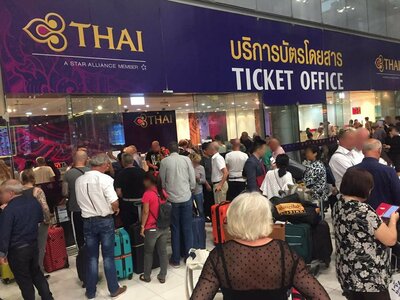Thailand Introduces New Tax Incentives to Attract Overseas Income
The Revenue Department aims to boost domestic investment by exempting foreign-sourced income from taxation for a limited period.
The Revenue Department of Thailand is reforming its approach to taxing income sourced from abroad, seeking to stimulate the domestic economy by encouraging individuals with foreign income to repatriate their funds.
This initiative involves granting tax exemptions for income that is promptly remitted to Thailand, a strategy aimed at increasing liquidity and bolstering domestic investment.
According to Pinsai Suraswadi, the Director-General of the Revenue Department, preparations are underway to draft legislation that would amend existing income tax collections.
This amendment will exempt taxes on foreign-sourced income when brought back into Thailand, thereby incentivizing the return of investment funds.
It is estimated that roughly 2 trillion baht is currently invested by Thais abroad, in various forms such as land purchases, insurance, or foreign funds.
The proposed amendments will include a two-year personal income tax exemption for individuals who reside in Thailand for at least 180 days within a calendar year.
This exemption applies to all income earned—both within Thailand and from foreign sources.
If the foreign income is brought back to Thailand within two years of its earnings, it will not be subject to taxation.
However, if the income is repatriated after the two-year period, it will fall under the normal tax regulations.
The regulatory changes will take effect following their formal enactment by the Finance Ministry, which will produce a ministerial regulation that clarifies these tax exemptions.
Currently, individuals are liable for personal income tax on foreign income as soon as it is brought into Thailand, regardless of whether it was earned in the current year or a preceding one.
However, prior to January 1, 2024, income brought into Thailand after the year it was earned was not subject to personal income tax.
The two-year exemption is designed to allow adequate time for taxpayers to prepare for repatriation, especially in cases where income is earned at the end of the year.
This approach aims to ensure that individuals can effectively manage the logistics of transferring their foreign income back to Thailand within the specified timeframe.
The Revenue Department emphasizes that this new regulation does not retroactively apply to income earned before the regulation's enactment.
The taxation rules will remain distinct from investment funds that flow in or out of the country; taxation will only apply to the benefits derived from those investments, such as interest income, dividends, capital gains, and other types of income.
Thailand's taxation framework is built upon international tax principles, particularly the residency rule, which requires that individuals residing in Thailand for at least 180 days are subject to Thai income tax regardless of their income's origin.
The prerequisite for foreign income to be taxed includes residency in Thailand and the repatriation of that income.
In cases where foreign income has been taxed in the source country, taxpayers may qualify for a foreign tax credit provided that a double tax agreement (DTA) exists between Thailand and the foreign country.
The complexity of tax calculations increases when taxpayers have both domestic and foreign sources of income, as the credits claimed cannot exceed the domestic tax liabilities.
Tax incentives may include deductions related to employment income, with allowances for expenses and personal deductions also specified.
For example, taxpayers can deduct a portion of their salary expenses while adhering to specific caps on allowable deductions.
This approach reflects a significant shift in Thailand’s fiscal policy, aiming to attract capital inflows and enhance the liquidity of its domestic economy.
This initiative involves granting tax exemptions for income that is promptly remitted to Thailand, a strategy aimed at increasing liquidity and bolstering domestic investment.
According to Pinsai Suraswadi, the Director-General of the Revenue Department, preparations are underway to draft legislation that would amend existing income tax collections.
This amendment will exempt taxes on foreign-sourced income when brought back into Thailand, thereby incentivizing the return of investment funds.
It is estimated that roughly 2 trillion baht is currently invested by Thais abroad, in various forms such as land purchases, insurance, or foreign funds.
The proposed amendments will include a two-year personal income tax exemption for individuals who reside in Thailand for at least 180 days within a calendar year.
This exemption applies to all income earned—both within Thailand and from foreign sources.
If the foreign income is brought back to Thailand within two years of its earnings, it will not be subject to taxation.
However, if the income is repatriated after the two-year period, it will fall under the normal tax regulations.
The regulatory changes will take effect following their formal enactment by the Finance Ministry, which will produce a ministerial regulation that clarifies these tax exemptions.
Currently, individuals are liable for personal income tax on foreign income as soon as it is brought into Thailand, regardless of whether it was earned in the current year or a preceding one.
However, prior to January 1, 2024, income brought into Thailand after the year it was earned was not subject to personal income tax.
The two-year exemption is designed to allow adequate time for taxpayers to prepare for repatriation, especially in cases where income is earned at the end of the year.
This approach aims to ensure that individuals can effectively manage the logistics of transferring their foreign income back to Thailand within the specified timeframe.
The Revenue Department emphasizes that this new regulation does not retroactively apply to income earned before the regulation's enactment.
The taxation rules will remain distinct from investment funds that flow in or out of the country; taxation will only apply to the benefits derived from those investments, such as interest income, dividends, capital gains, and other types of income.
Thailand's taxation framework is built upon international tax principles, particularly the residency rule, which requires that individuals residing in Thailand for at least 180 days are subject to Thai income tax regardless of their income's origin.
The prerequisite for foreign income to be taxed includes residency in Thailand and the repatriation of that income.
In cases where foreign income has been taxed in the source country, taxpayers may qualify for a foreign tax credit provided that a double tax agreement (DTA) exists between Thailand and the foreign country.
The complexity of tax calculations increases when taxpayers have both domestic and foreign sources of income, as the credits claimed cannot exceed the domestic tax liabilities.
Tax incentives may include deductions related to employment income, with allowances for expenses and personal deductions also specified.
For example, taxpayers can deduct a portion of their salary expenses while adhering to specific caps on allowable deductions.
This approach reflects a significant shift in Thailand’s fiscal policy, aiming to attract capital inflows and enhance the liquidity of its domestic economy.











